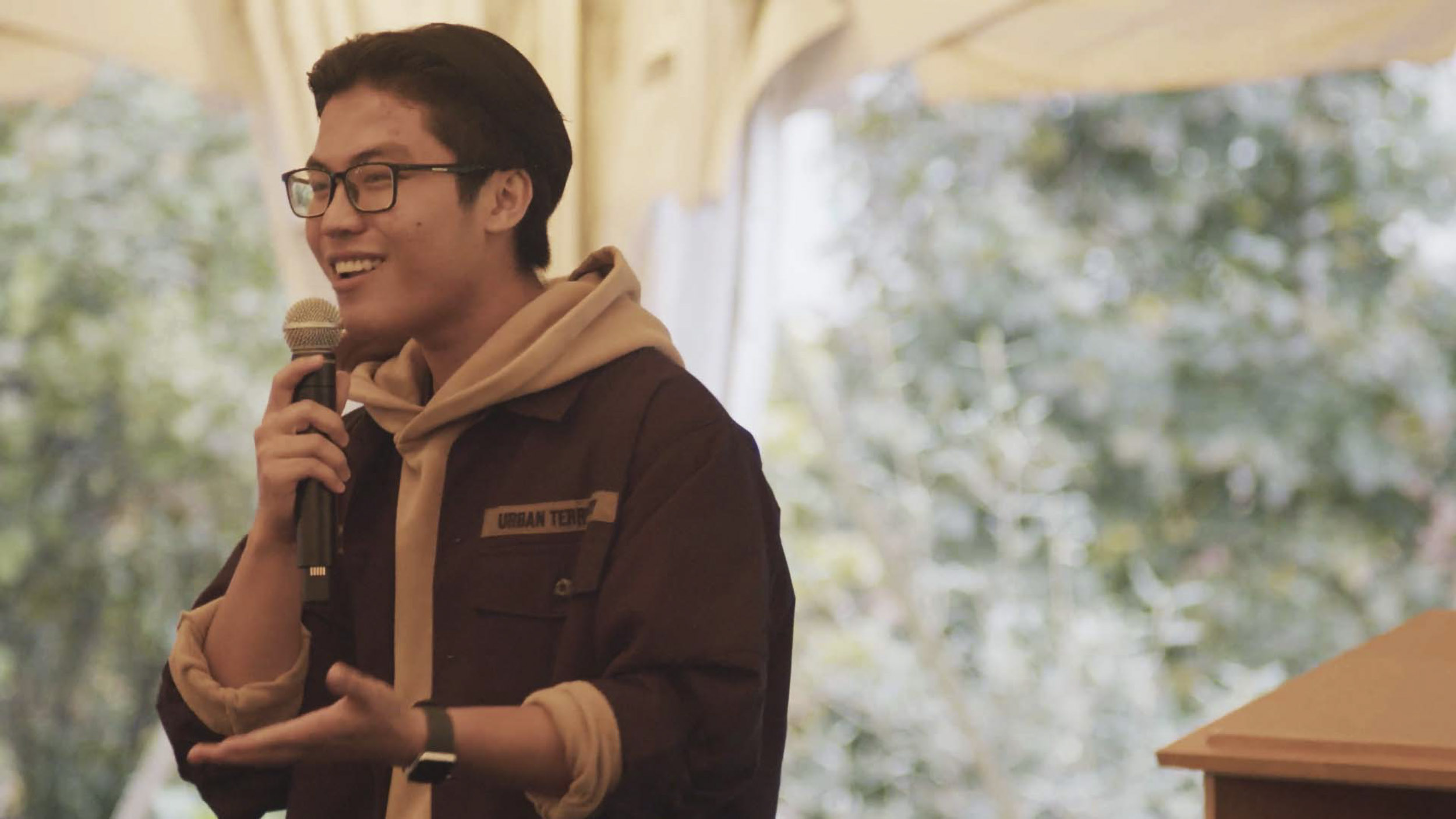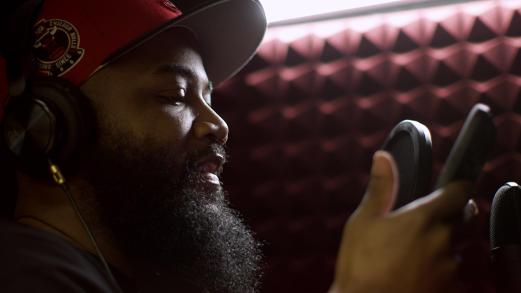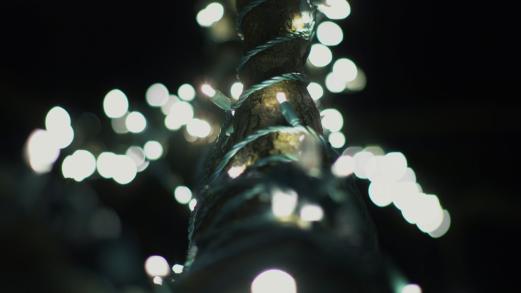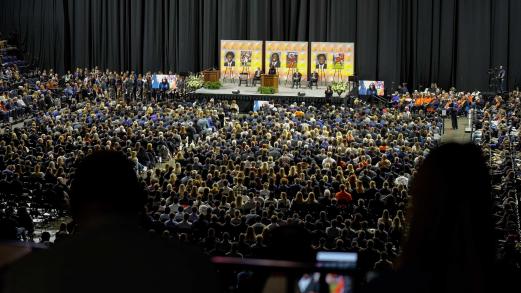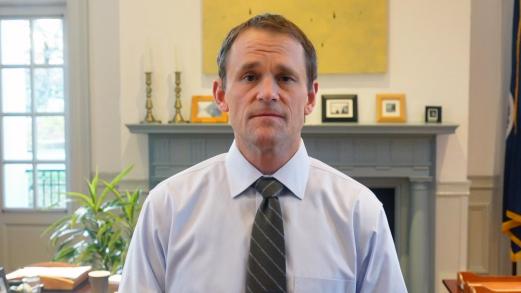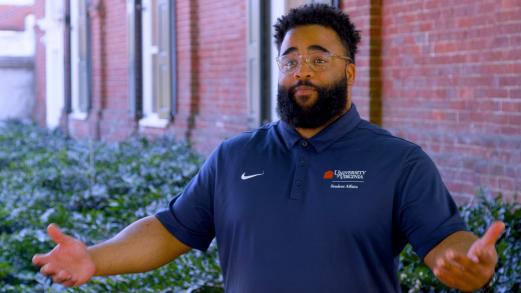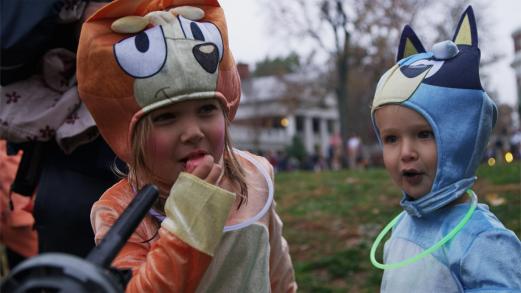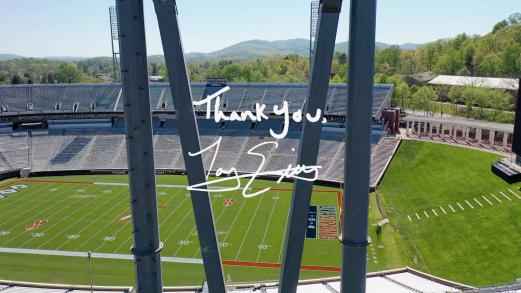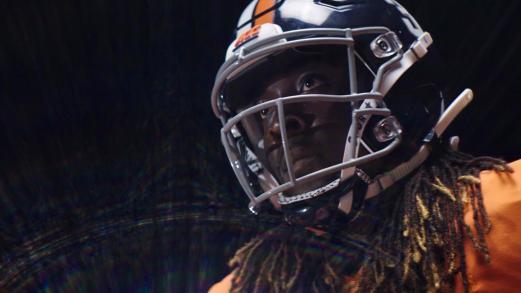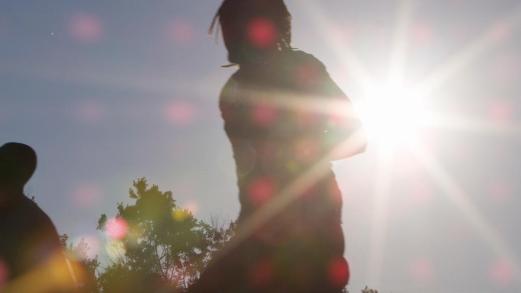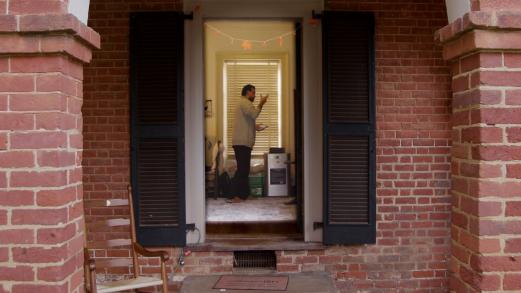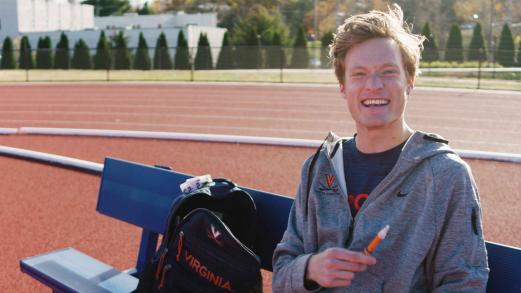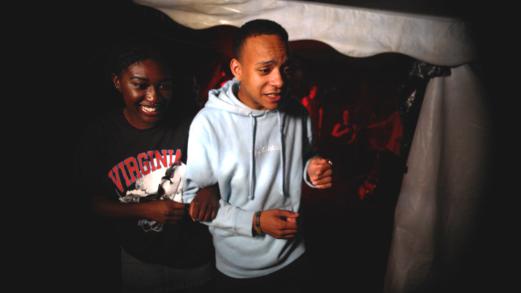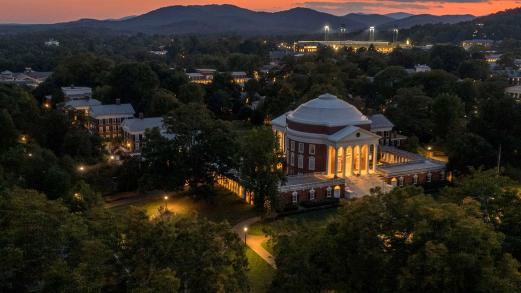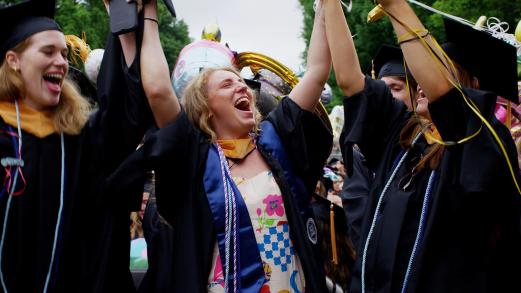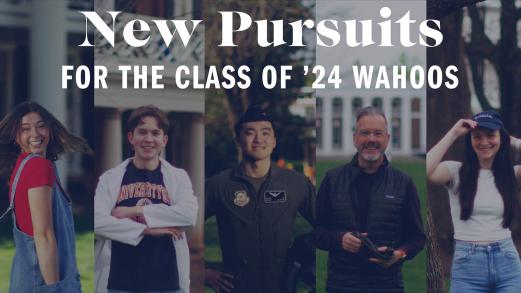Good evening, and welcome to Double Take-- Stories That Make You Think Twice. My name is Sarita Mehta, and I'm a fourth-year student here and the Student Member of the Board of Visitors. It is such an honor to stand before you all and welcome you to this year's event. As I look out into the crowd, I see leaders whose names are synonymous with UVA.
I see students whose hardships and struggles I could hardly fathom. And I see individuals whose selflessness is humbling. But as I look out into the crowd, beyond this, beyond labels and titles, I see people.
When all is said and done, we are just that, people, sharing in the highs and lows of this great human experience. There is something incredibly powerful about that. To tell you a little bit about myself, I'm a Texan through and through and a pretty extroverted person.
I will always stop to talk to the grocery store cashier or talk to the corner ambassador for 10 minutes. Growing up, my dad taught me you can always learn something or laugh with anyone, regardless of who they are or where they come from.
As a first-generation immigrant speaking broken English, my dad believed in that common thread of humanity that binds us all and transcends differences. I believe in it, too. You would be surprised by just how much you can learn from the people around you.
In conversation after tonight's event, I urge you to learn, and share, and teach, and laugh with someone new. Today, we're going to hear from some incredible members of our university community. Their stories are just a few narratives that highlight the power
of reflection, resilience, and people.
I am certain we will all walk away learning new things about ourselves and life from each of these individuals. Don't let the lessons
learned from these few hours be siloed to these few hours. Carry them with you day in and day out. Share your stories. And listen, really listen, to others.
This event would not be possible without the fearless and, quite frankly, awesome leadership of Stacy Smith, Matt Weber, and Jess Harris, and of course, our very own President Ryan. This would not be possible if not for the amazing individuals who gave their time today to share deeply personal stories. And it would not be possible without each of you sitting in the crowd, who decided to give your time today to listen and learn and to open your hearts and ears. So thank you.
Together, you and me and the person to your left and right, we represent the power in our story, in your story, in the larger story of
our university and nation. Even when it isn't pretty or perfect, even when it's more real than you would want it to be, your story is what you have, what you will always have. Thank you all so much for being here this evening. And without further ado, please enjoy Double Take.
Exactly two weeks ago today, almost to the hour, my brother shared something with me, and that has completely rocked my world. And I hope to tell you about it and maybe even share it with you. But first, I have to give you some background.
You see, this brother, Damon, I met him for the first time ever in my life about 10 weeks ago. Now, he's 50 years old, and I'm 49 years old. How did we go our whole lives and just meet weeks ago? Well, at one level, it's a very simple story. We share the same biological father. We have different mothers. We grew up with our mothers mostly, in different families, in different parts of the country, never had a chance to meet. But when you're talking about families, it's always more complicated than the simple story.
So I grew up in New York. I grew up with my mother, her husband, who I considered Dad but not my biological father, their two adopted children, their three natural children. There were six of us, two loving parents in a dysfunctional but wonderful home on Long Island in New York. Now, what makes it maybe a little more spicy than the typical family is that my two oldest siblings, my older brother was adopted from the Sioux Nation in South Dakota, my oldest sister adopted from the Cherokee and Pima Nations in Arizona. And unlike all the other five Solomon siblings, only my biological father was Black. But Linda, Harold Solomon, two New York Jews with six kids-- I had a good life, and a good family, and a wonderful dad, who celebrated me, cheered me on, loved me above everything else. But for the first 21 years of my life, I wondered about my biological father. Where was he? Was he alive? Was he healthy? What did he look like? What was he like? What did he sound like? Do I get my voice from him? Do I get my looks from him, my height, my eyebrows? I always wondered.
I tried to put together a textured life from the facts I got from my mother, that he was an activist. They met on Martin Luther King's Poor People's Campaign. They had chained themselves to a hospital that was segregated to try to integrate the hospital, that he might have had a collapsed lung, that she thought he had two sons and was going through a separation or divorce, that he was angry often. But back then, it was hard to find him. I used to check the obituaries in Long Island Newsday-- never saw his name. But I didn't even know where he lived. Fast forward a little bit. 1994, I'm trained on a news clipping service, kind of like the Stone
Age precursor to Google, LexisNexis machines. And what do I search for with my 10 free hours of training? I searched for the name I'd known my whole life and learned a lot. Tracked him down.
Wrote him a letter. Didn't get a response, so I went to find him. And this is actually not the main story. But I went to find him and met him in Pennsylvania. And despite all my myth-making and fantasies, he was just a man. He was, frankly, as cautious as he may have been courageous, as fearful as he may have been ferocious. I don't think he knew what to do with me. I don't think I knew how to ask the questions that he knew how to answer. I did get some information. But I left there saying, he's just a man. And I went back a few times and had a few more times to exchange information with him. And I always imagined that someday he'd introduce me to his sons, and I'd learn more. But life is busy. And I had kids, and I went to law school, and things happened. And time went on, time went on. And one day, I think my wife had heard that her father had died. So I Googled my father's name and saw that he'd died. And I imagined again, someday I'll figure out his sons.
Well, in 2017 my then 15-year-old son Miles, who some of you may have met, was really curious to know more about our biological heritage on my father's side, the Black side of the family. So I, candidly, got pretty obsessed. And the investigative power that exists now, with DNA testing, and Google, and LinkedIn, and Facebook, where everyone poses with their family members and tells you who their family is-- really quite powerful. And over the course of the past four years, I found those two brothers, found two more brothers, found three sisters. Now, I'm not going to say we're now one big happy family. Some of them are fabulous, and delighted, and overjoyed to have me connected, to have more people to love in the world. And others remain cautious, suspicious, not sure what I want, afraid I'm up to no good somehow, think there's something they can do for me that I'm seeking. But despite the rejections, I got so much more than I could possibly have bargained for, dozens and dozens of cousins, great siblings and their kids, new nephews and nieces.
The gifts I've received far-- and the gifts of welcome that I've received far outweigh the pain of any rejection. So speaking of gifts, let me come back to what my brother shared with me two weeks ago tonight. It was a guest blog post from the Columbia University Press Blog. And it referenced a film, The Man in the Middle. And it talked about a Civil Rights activist.
It was a 1966 police training video. So I wrote a quick email to Professor Steven Charbonneau at the Florida Atlantic University, who authored that blog post. He actually quickly and kindly sent me a chapter of his book, where he elaborates on that blog post. And then I work for a university.
I can actually get a film in archives, get this 22-minute police-training video sent to the University of Virginia, or rights transferred to the University of Virginia, so that I could watch this. Now, let me tell you the surreal aspect of watching a 55-year-old film with a 30-year-old version of your father with a megaphone, commanding audiences, bigger audiences, walking across the street, talking to police and youth, urging the police to understand the perspective of the youth, and actually takes out a Life magazine, puts it on the floor, and is pointing to and saying, this is what kids are seeing, examples of police-- the police, the dog, and the abuse. It doesn't matter that it's in Selma, Alabama, or South Jamaica, Queens, New York.
This is what they were seeing, urging people to take the perspective of others to understand what's going on. Now, some of you know my interest in fostering dialogue and conflict resolution. To see my biological father doing it was really quite profound. Now, also profound for my brother Damon. In the film, he sees his father and his father's wife, his mother. First time he saw that picture of them together other than their wedding picture because they, of course, did get divorced. As I realized that the message of my father about taking other people's perspectives-- I can apply that to my own new siblings as well, who lived 50-plus years of their own lives, and all of a sudden this overeager, somewhat obsessed brother comes knocking on the door to say, here I am. But it really does make me realize that as I now uncover more and more layers of ancestry and DNA, we're all family. Thank you.
This year, I learned that heroes truly do exist. Some wear medical scrubs. Some fight villains with mops and with wipes. And some are angels truly walking among us. One of those angels, my uncle, Khalu Eltayieb Ahmed Elnaiem, got COVID-19 last year. December 18, 2020, was the last day of our first full semester during the pandemic. After I finished my last exam in a weird and empty Thornton Hall, I was ecstatic to celebrate that night.
So I decided to do a Zoom call with some of my friends. Around 3:00 AM, I was just laying lazily on my couch, talking with their little box faces on my laptop, when all of a sudden I got a phone call from Sudan. That was weird, especially at that hour of the night. So I turned to my laptop. I told my friends, sorry, one second, I need to take this call, and muted myself. Then I stared at my phone for a bit. And thoughts raced through my mind about what might be happening because whatever this was, it wasn't good. I answered the call to my cousin Aaliyah and heard her speak to me over a background of wailing and sobbing.
December 18, 2020, my angel, Khalu Eltayieb Ahmed Elnaiem, gained his wings and returned to the sky. Now, I'm telling you all that he's an angel. And I recognize most of you don't know him. So I'll tell you a bit about why he's so special. Khalu Eltayieb was born in April of 1954 in my home village of Almaghaweir, Sudan. My mom used to tell me stories growing up about how he was a jokester, about his tomfoolery, but also of his pure heart, as he used to give so much to my grandmother, Haboba Aisha. Around 21 years old, he left Sudan to study medicine in Pakistan, and then return to be a doctor throughout the country, and to provide food during the famine. After that, he moved to England and then Saudi Arabia to practice orthopedic surgery. All of my fondest memories in life are thanks to Khalu Eltayieb.
When I was 13, he organized a trip for my family and I to go to Bahrain, where he lavished us every night that we were with him. The summer before my first year, he put together a trip for us to go to England and Scotland, where we got to meet his old friends. And the winter of 2019, he organized this massive family reunion for all of us to go to Sudan for my cousin's wedding, where he put together a beautiful boat ride for us up the River Nile. The amazing thing about him is that his love and his generosity are boundless. See, for years now, I've been seeing my family crumble in front of me. Khalu Eltayieb couldn't just watch this happen. He invested in us so that we had a reason to still feel joy. And I learned recently he didn't just do this for me and my family. He did this for dozens, if not hundreds, of other people. Although he lived in Saudi Arabia, he constantly went to Sudan and took medicine, going door to door, serving anyone who called on him. My most recent memories with him are working on his nonprofit, SEDSO, the Sudan Education Supporting Organization.
The fall of my first year, he messaged me on WhatsApp, asking me if I could help him put together a GoFundMe because 24 school children in Almanaseer, Sudan, drowned when taking a boat on their way to school. Just like he couldn't see my family suffer, he couldn't watch this community suffer. So he organized a group of people to build a school in Almanaseer so the children wouldn't have to travel as far for their education. He then took that active service and grew it to an entire organization, which has now built over 50 schools throughout some of the most under-resourced areas in Sudan. It is really remarkable.
Today, I attempt to live my life in the legacy of Khalu Eltayieb. All I want, all I aspire for is to be kind and to serve others. And I think about him in my daily actions. When I host people in my lawn room, I think about how much joy it brought me when he hosted me in Bahrain. And I think about how I can reciprocate that warmth to others so they can feel joy, no matter what's going on in their life. When I engage with people, I think about how I can acknowledge and then serve everyone that I meet, just as he kept on giving, and giving, and giving to hundreds of patients and to schoolchildren. And when I am engaging in my community, whether it's organizing in the engineering school or it's organizing in Multicultural Student Services, I think about how I can rally people to serve those who need it most, just as my uncle did with his NGO, or in his nonprofit. I really regret that I didn't tell my uncle that I loved him. I didn't tell him how much I admired him when he was still around.
I didn't thank him for all the trips. I didn't tell him how much his dedication to people meant to me. And now I live with pain because it's too late. So another lesson that I learned from Khalu Eltayieb is to not withhold love and to not withhold gratitude, because the opportunity to give it is fleeting. Last week, when I was walking to my lawn room, I found a white rose and a letter sitting outside of the door. And it was a letter from the Angels Society, thanking me for my commitment to my friends, for supporting my community, and for grounding myself in compassion. Khalu Eltayieb, as you listen from above, I want to thank you. And I want you to know that so much of how I live my life is with thanks to you. Many mornings, I wake up, and I don't want to get out of bed.
I don't want to go into a day that is going to be draining and tiring. And I don't want to go into a world without Khalu Eltayieb. In those moments, I reach for my phone. And I play a song that reminds me of him. In Arabic, the song goes like this. [SINGING] And in English, that translates to, may you find good and reward in this world. May you taste blessings. And may you taste peace. May God increase the good in your life. Live on, Khalu Eltayieb, the Good One. You are always within us and close to us. Live on, the Good One. You are always within us and close to us. Thank you, Khalu Eltayieb for teaching me how to serve, how to be selfless. Thank you for teaching me how to live without restraining love and gratitude. Thank you for teaching me what it means to be a true hero. I love you, and I pray that your legacy lives on within me. Thank you.
Good evening. My name is Ken Elzinga. And this is my Double Take. I've been on the faculty at the University of Virginia for many years. And I'm told I've taught more students than any professor in the history of the university, somewhere around ,. And yet with all my years at UVA, there's something that most of my students, and frankly many of my colleagues, do not know about me. And that is I'm a widower. My wife Terry and I have been married for about four decades. But when I first joined the faculty at the University of Virginia, I was newly married to a woman named Barbara. We were not married very long because Barbara died of cancer.
Much of our brief marriage was spent with chemotherapy, remission, recurrence, radiation, remission, recurrence, until finally, it was the end. Barbara died of cancer at the UVA Hospital. She was only 33. Now, in the few years that we were at UVA, Barbara was a great friend to students. I can remember coming home, seeing cars in the driveway, thinking these were students here to see me. But in walking in the house, I learned that they were there to see my wife. Hundreds of people attended Barbara's memorial service, which was a distinctly Christian service. I had become a Christian in graduate school. Barbara had become a Christian through the ministry of an evangelist named Billy Graham.
So what is my Double Take? The invitation to give this talk, especially talking with Matt about this, brought back memories of something that I had not thought about for a while. Barbara's death was very difficult for me. But what struck me at the time, and which I have revisited for this talk, is that I was never angry with God. And frankly, this puzzled me. And let me try and explain why anger with God never set in. As a follower of Jesus, I had a high view of the Christian Scriptures. And there's a passage in the Book of Job that goes like this.
The Lord giveth. The Lord taketh away. Blessed be the name of the Lord. And this verse drove home to me that while Barbara was my wife, she didn't belong to me. She belonged, in life and in death, to her Lord and Savior Jesus Christ. And I had to recognize that the Lord had taken away. And then at that time, a black swan event happened in my life. An antitrust attorney, not at Latham & Watkins but at Arnold & Porter, did something very unusual.
This partner at this distinguished law firm had a small plaque made and sent to me out of the blue with a Bible verse on it. And it's a Bible verse I'm sure I had seen before. But I had never paid any attention to it. It's from Psalm 116. And the verse reads, "Precious in the sight of the Lord is the death of His saints." Now, I don't pretend to understand that verse, even to this day. But it brought comfort to me. My wife's death was not precious to me. But somehow, in the mystery of the Heavenlies, it was precious to my wife's Lord. And then the apostle Paul made an entrance. And the apostle Paul wrote to those Christians who were grieving about the death and the loss of others. He wrote, "We sorrow, but not as those who have no hope." "We sorrow, but not as those who have no hope." Now, most people, when they read that verse, they focus on the second part, the reference to the blessed hope, the hope that those who die in Christ, like my wife Barbara, will have eternal life in Heaven, with God. But the focus for me was on the front part of that verse, "we sorrow." "We sorrow"-- it's as though the apostle Paul said to me, Ken, the Christian faith is not about stoicism.
The Christian faith does not endorse "big boys don't cry." The Christian faith endorses sorrow. And those combination of verses and other factors kept me from being angry with God. Now, I realize that what I've just said, particularly in an academic community like this, and no doubt to some of you, probably seems pollyannaish or delusional, in a Marxian term, an "opiate of the people" kind of stuff, or even religion as a crutch. It might surprise you how much I understand why you would think that. But this is why I'm not angry with the God of Abraham, Isaac, and Jacob, and for the triune God that I know as Father, Son, and Holy Spirit. My name is Ken Elzinga, and that was my Double Take.
I think of myself as lucky-- well, maybe not that lucky, since I was diagnosed with a rare bone cancer when I was 16, but lucky since I am still here today. When trying to come up with what I wanted to speak about, I was stuck. I didn't feel like anything I learned was profound enough to tell my story. However, my father felt differently. He told me that I was a survivor. This made me mad, and I decided I officially did not want to tell my story. You see, I didn't do anything special to survive. And I certainly didn't do anything differently than my friends who passed away from the same disease. So what makes my story as a survivor meaningful in the first place? My friends who were given a terminal prognosis suffered far more than I did.
They endured more rounds of chemotherapy, more surgeries, and more heartbreaking bad news. They should be here today giving you a life lesson instead of me. So I'm not going to tell you my story. I'm going to share with you what three friends of mine, all diagnosed with terminal osteosarcoma, taught me about life. I first met Kelly at physical therapy. She had just finished treatment, and I was just starting. I knew who she was because my parents and doctors kept trying to connect me with other kids with osteosarcoma to "talk about our feelings." But I really didn't want to. Our moms began talking about Kelly and I in front of us as if we weren't there, just like how moms do. And my mom mentioned I was getting really nauseous every time they would flush my IV line with saline. When I tasted the saline, my brain immediately connected it to chemo, and I would get sick.
Kelly overheard my mom and piped up, saying that it was sort of a hospital secret, but the nurses have a secret stash of IV flushes without saline. But they only used them if you asked for it. It was through Kelly's advice that I understood the power of connecting with other people going through the same thing as you. Kelly and I quickly became friends. And she told me everything there was to know about the treatment road ahead of me. I'll be forever grateful for the guidance she gave me and what she taught me about being there for others, especially when someone is suffering.
She gave me hope and made sure I knew she was there for me. Words cannot describe how much this shaped the rest of my treatment. And thanks to Kelly, I became friends with John. John was diagnosed a month after I finished treatment. And I like to think that I was his version of Kelly, telling him what to expect and the ins and outs of the hospital. John was my osteo friend that I knew the longest. I could talk about the time we were invited to the White House to meet with former Vice President Pence to talk about a new cancer bill, and instead spent 15 minutes trying to convince Pence to shave his head for Cancer Awareness.
[CHUCKLING]
He didn't end up doing it-- or about all the illegal schemes we came up with because everyone knows you can't arrest or put a kid with cancer in jail.
John taught me so much. But the most meaningful thing he taught me was to look at the world in a broader perspective than yourself, and to have empathy for those around you, always, even when you were suffering. Around the same time John was given a terminal prognosis, I was told I would have to have my entire knee and parts of my tibia and femur replaced, again, due to an infection on my metal prosthesis. I tried to hide this from him, since what he was going through was so much worse. But every single day, he asked how I was feeling and how my leg was doing. Instead of comparing our suffering and being bitter about the unfairness of the world, he just wanted to make sure I was all right. The night before my surgery, John and I went to a Capitals hockey game. And when I walked into the building the metal detector went off. I explained to the security guards that I had metal in my leg. John went through next, and the alarm went off again. John explained how he, too, also had metal in his leg. The eyed us suspiciously. What are the odds that two 19-year-olds both have large metal implants in their legs? He definitely thought we were up to something. We laughed.
This was something that could only happen to us being together. We had so much fun at the game. And I remember being so amazed at his perspective on life, his constant smile, and his ability to focus on others. He was always thinking beyond himself. The next morning, I went in for surgery, only to awake eight hours later and learn that John had passed away. Not a day goes by that I don't think about our friendship. The last friend I want to talk about is Charlotte. When Charlotte and I first met, we quickly realized we both had twin brothers, which gave us a lot to talk about. Our friendship might have started because we had the same cancer, but that was not at all why we got along so well.
Since Charlotte lived in California, I didn't get to meet her in person until she came to UVA. She was probably the most excited and optimistic person I had ever met. What Charlotte taught me is to never let anything stop you from living life the way you want to. Days before Charlotte passed away, she was talking about how excited she was for her senior year of high school, and that she was working hard on her UVA application. UVA was her top choice and she decided to apply early decision here. Charlotte wasn't going to let anything, even a terminal prognosis, stand in the way of her being excited about life and what the future might hold. She was still going to write her college essay.
She taught me the importance of living the life you want to live, even in the face of adversity. And when I walk around grounds, I can't help but think of how much she would have contributed to UVA. Now, back to survivorship, and what it means to survive. When it comes to cancer, I'm not sure surviving means anything more than being lucky that you had access to treatment and that your body happened to respond well. I didn't survive a week in the wilderness like some guy from a survivalist show who escapes bears or eats gross bugs. Anyone who knows me knows I would never survive a week alone in the woods. No, I got really sick in a hospital bed, and luckily, the medicine worked.
Although I don't think surviving means much, I do think there are ways that I can make my survivorship meaningful. To me, this means living every day the way Kelly, John, and Charlotte lived theirs. I want to form powerful relationships with people, especially with those who might be going through the same thing. I want to have a perspective outside of myself that sees the bigger picture and is able to always be thinking of others. And lastly, I want to live my life with purpose, the way I choose, and without letting anything stop me. If I can live my life with these lessons learned from these beautiful and brave human beings, only then will I believe that survivorship is meaningful.
Hello, everyone. I'm Huynh. I'm an international transfer student from Vietnam. And I have recently transferred from a university in Italy. It's a very long road. I'm here to share with you the transfer process because it was truly transformative and a little bit unorthodox. Why? Because I did it without the knowledge of my parents. My parents didn't know. And, no, I didn't hide it from them because I was afraid of jinxing it or I was afraid of pressure or anything. I hid it away from them because they didn't allow me to transfer. They had very good reasons for not wanting me to go to the US. They think that the US is a tad bit dangerous for someone a tad bit eccentric like me.
They think that Europe is much closer to Vietnam, so they can visit me more often. And most importantly, I've always been an academic underdog. I fell short here and there, and they saw me that way. And they thought that I couldn't get into a good US college. And even if I could, I wouldn't thrive in one. I, on the other hand, have very good reasons for wanting to go to US. The number one reason is that my English is much better than my Italian-- mamma mia.
[CHUCKLING]
But all jokes aside, the real reason that I wanted to go to the US is that I wanted a liberal education, an education that takes my unique experience and my unique background into consideration. It's all about individuality and intellectual independence for me. And I really saw the US that way, and I really wanted to go. So we sat down.
We talked about it a few times. In the end, the answer was still no. And they told me, Huynh, you're not old enough to make these decisions. Be grateful for what you have. Don't throw away your shot. And do any of you get really annoyed when your parents tell you you're not old enough to do something or to decide something? I was extremely annoyed. So what did I do next? The mature thing to do was to either listen to them, sit down and talk it out, or agree to disagree at the very least. And as you can guess, I did the opposite. I didn't listen to them. I didn't sit down and talk it out. And I disagreed to disagree.
To put it blatantly, I lied to them, and I continued the transfer process behind their backs. And it was tough. It was really tough, I'm telling you. So COVID was happening at the time. So I had to stay in Vietnam and do the online semester and then do the whole sneaking around. And also, it was such a challenging endeavor to undertake without the support of my parents, without their advice, without their guidance, without all of their resources. But I managed.
For the first half of application season, I managed really well. But then the SAT and the College Board came around. So you've probably heard stories about how the SAT and the College Board crush ambitions of college applicants. But the way they did me in was just unexpected. So I was registering for the SAT 2.
And there's this little box called CC a Parent. And if you tick that box, they will send a copy of your test registration straight to your parent's inbox. And I've already ticked that and filled in the emails when I registered for the SAT 1 the first time around.
And that's how they found out. It's very ironic, very, very ironic. And I can almost laugh about it, if not for what happens next. So the gist was up. And I was surprised that it ran for this long because my parents would always know when I'm up to something or when I'm lying to them. And maybe that's why they were so hurt when they found out that they had been lied to. The night that my mother found out, she and I had one of the biggest arguments of our lives.
She called me immature, ungrateful. And I told her that you don't understand me, you know? And we both said things that we regret. And the fight escalated to a point where I had to leave the house. And that's how it happened, how I was practically disowned for trying to take the SAT.
And these are the moments that sometimes you don't get to see behind a college application. Behind all the stellar test scores, and near-perfect GPAs, and the inspirational essays are these moments of hardships, of confusion, of not knowing what's going to happen next, of not knowing if things are going to work out for you.
And for me, it was a total rock bottom. And because of having to leave the house, I spent the next week living with my grandparents. And during that time, all I can think of is how much my parents hurt because I lied to them, and how much I miss them, and how much I just really want to go home, give them a hug, apologize to them, saying that, Mom, Dad, it's all over. I'm going to listen to you from now on. I really wanted to do that. I really wanted to go home. And while waiting for permission to go home, I started reflecting on what my parents has given me. I really want to renew my sense of gratitude and my sense of appreciation, so when I go home I can present that to them. And I started remembering things. So when I was 8 years old, my family sent me to a Catholic school in Australia. Imagine an Asian kid who can barely speak English.
He's going around, offering people Vietnamese food. You want some banh mi? I really want to be your friend, come on. And that kid is also attending mass every Sunday without the knowledge of what religion was at the time. Skipping forward a few years later, my parents sent me to a golf boot camp in Arizona on a scholarship. Again, imagine a barely-5-foot Asian kid trying to keep up with varsity athletes throughout 18 holes during the day, and trying to keep up with them again through dodgeball and laser tag during the evenings. It was just these bizarre experiences. And as I recalled them more and more, I started to see the values that I gained from them, the interpersonal skills that allowed me to break down any culture or language barrier, the flexible tenacity that allowed me to walk any paths ahead.
I'm so grateful for all these experiences. And that's when I realized one of the greatest gifts that my parents has given me is allowing me to go to these bizarre adventures so far away from home, and allow me to learn from them. And that is when I realized I cannot stop with my college application now. Even though they don't want me to, I have to press ahead, continue to find myself in unfamiliar footings, and embrace the novel challenges ahead, and become the best version of myself, because I sincerely believe that if my parents have the resources that they had given me, they would do the same. So I marched home. I offered them a sincere apology. But aside from that, I showed them my game plan, showing them that this isn't a Hail Mary, that I have a good chance of getting into a good US college, and even thrive at one. And I'm standing here before all of you right now, so you can probably guess how the argument went down.
[CHUCKLES]
So it's-- this journey is still so surreal for me. It still feels like a dream, as I go into one of the best colleges in the United States, walking around this beautiful campus, and now standing here before all of you. And I not only have my parents to thank, but this time, also myself. Thank you.
So for as long as I can remember, my parents have written me letters. And these letters have come to mean so much to me that I actually keep a note that my mom wrote me about 10 years ago in my wallet. And I refer back to it when I need a little boost. I actually checked it earlier today.
And there's a note that my father wrote me that I love so much in that I framed it, and I put it on my wall in my house. And so it's really no surprise that when I had two kids of my own, I started a similar tradition with them, although it takes a slightly different form. So I have two little boys. One is now 4, and one's almost 2 and 1/2. And when each of them were born, I started writing in a journal for them. And I write in these journals whenever I am moved to do so. So as parents, some of you might know what that feels like. It's a day that you want to remember every detail of, or it's something funny that they did, or it can honestly be just marveling at watching them become little people exploring the world. But what's really interesting is if you thumb through their journals, you'll notice that almost the entire year of 2020 is blank. I didn't write anything at all. And I'm sure there are many of you in this room who would say, well, this actually makes a lot of sense. 2020 was brutal for so many people for so many reasons. And you had young kids, and you were probably really scared.
And you were probably really overwhelmed, and maybe you just didn't have the words at the time to be able to explain to your kids what was happening in the world. And I think a lot of parents would feel the same. And that was true for me, too. And then there's another group of folks, maybe a slightly smaller group but that know me a little better. And they would say, well, you know, I also know, Lily, that you were going through this professional proving process. You had thrown your hat into this ring for this job and, as your dad likes to say, swinging for the bleachers with this role at the Alumni Association. And you were probably pretty scared about how that was going to turn out, and maybe overwhelmed by the process and having to prove yourself day in and day out. And maybe you just didn't have time to write to your kids in those journals. And to that group, I would say, absolutely, that was true, too. There was a lot going on last year. But then there's a smaller group of people who really had a front-row seat to my life over the past 18 months. And some of them are here today.
And I think they would have a slightly different explanation. I think they would say, I don't know if it was the pandemic alone, although that was obviously so challenging for so many. And I don't think it was this professional process you were going through. I bet the reason why you didn't write in those journals is because you were going through a difficult divorce. And you had young kids. And you were really, really scared about how things were going to work out. And you were really overwhelmed, maybe so much to the extent that sometimes you felt like you were drowning.
And maybe you just didn't know how to talk to your kids. or you just didn't have the strength to be able to explain what you were experiencing. And those people would be the most right. You see, the thing about letters or journal entries is they have a permanence to them, right? That's what makes them so special is that you can hold on to them.
And they last forever, like I have held on to that note from my mom. But that's also what made me so fearful about how I could talk to my kids about what I was going through. I was so worried I would say the wrong thing, or I would say too much, or say too little, or perhaps at worst, interrupt an otherwise beautiful and blissful childhood for my kids.
And so I wrote nothing. And part of me is really frustrated at myself that I didn't have the strength in the moment to put pen to paper and actually write something down, because in the midst of dismantling my life and then building it all back again, there were actually so many beautiful moments with my little boys. There were so many joy-filled days.
And I want to tell you about one of them because it sticks in my mind. And it's something I wish I'd written down because it was just so much fun. So it was last fall, probably this time last year. And I bought these absurdly overpriced tickets to a Jurassic Park exhibit at the Richmond Raceway. And it was everything you think it was. It was over the top. And these clunky, oversized mechanical dinosaurs screeched and lunged at your car.
And you can imagine a basically 1-year-old and 3-and-1/2-year-old at the time going nuts. They loved this. It was their definition of a dream. And so we had a great time. And then afterwards, we were all hungry, so I drove us to the nearest McDonald's, went through the drive-thru, and got us each a Happy Meal, and parked in the parking lot. And we ate chicken nuggets, and we talked about dinosaurs while they sat on my lap in the front seat.
And we watched what ended up being the most spectacular moon rise I have ever seen over 64. And it was one of the best nights of my life, but I never wrote it down. And so as time has passed, and as I've gotten my feet under me over this past year, year and a half, I've thought so much about putting something in my children's journals to acknowledge what we went through, and just how transformative that year was for us in so many different ways.
And even though I wasn't able to necessarily find my own words, I actually was reminded of an email that I got at one of the darkest points of 2020. And it was from a friend of my mother's, who reached out and said that she had put me on this prayer list. So she was hosting services. She was at Harvard Divinity School at the time.
And she wanted me to know that I was on the prayer list, given what I was going through. And she also included a blessing, just for reference, in case I needed some words of comfort in a difficult time. And what she doesn't know, but I should tell her, especially after I give this talk, is that that blessing ended up being something I referred to more times than I can count over the course of these past months.
And it has served as really a guiding light for me in an otherwise really bleak and dark time. And I'd like to read that blessing to you today because it is also what I've ended up putting in my children's journals to mark 2020, and to acknowledge what happened, to some extent, and also maybe to serve as a guiding light, or source of comfort, or a lesson learned for them if they ever encounter a particularly difficult time in their lives. So I'm going to grab it.
And it's a blessing by John O'Donohue. And I think it can apply to anyone, anywhere who believes in anything. That's part of why I love it so much. And it goes as follows. "This is the time to be slow. Lie low to the wall until the bitter weather passes. Try, as best you can, not to let the wire brush of doubt scrape from your heart all sense of yourself and your hesitant light. If you remain generous, time will come good, and you will find your feet again on fresh pastures of promise, where the air will be kind and blushed with beginning." So some of you might be wondering how I started writing in my children's journals again after a long time away. And there was one entry at the very end of 2020. And it was on December 15, 2020. And I wrote in both of their journals separately. And it was actually right after I had found out that I had gotten the job that I had been working so hard for. And it's funny. I have to tell you that for the first time in a really, really, really long time, I finally felt like I had a beginning that was worth writing about. Thank you.
So I was born in Buffalo, New York. I'm one of seven kids. And if you count the dogs we had, I'm one of 10. God bless my mom. So I was born in Buffalo, New York. And growing up in Buffalo, New York, in this Irish-Catholic family, I was sent to the same school that my dad was in. It was a little Catholic school called St. Benedict's. And I remember going as a little kid, and going into school. Now, I was a happy kid. I was really happy. I loved it. And I remember playing along and doing kindergarten stuff. But the teacher always got mad at me. And I didn't know why. So fast forward, we go through the school, and I get to this point where my parents tell me, the teacher says that you're special, that you've got to go get tested for what you are going through. Sorry, I'm going to pull this a little bit. And so we ended up having to go to a special summer camp. I had no idea. I was 7 years old. And I'm like, OK, let's do this. And in my little kid head, I'm like, that's fine. And I remember waiting for the bus. And the bus pulls up, and it's not a big bus. It's a smaller bus. And I'm like, OK, cool.
I get in, in my little shorts and my little shoes. And I get in the bus, and the bus has cages on the inside. And I'm like, man, this is weird. But again, I'm a little kid. I didn't know what to think about that. And I sit next to my bus mate. And he's wearing a helmet. He can't see. He's drooling. And he's banging his head against the wall. And I'm like, OK, I guess this is where it is-- this is where we start as a little kid. So I went to the special summer school. And after it was over-- it was a dark time. I don't remember much about the school.
And I get back home. And then my parents say, well, you can't go back to that same Catholic school anymore. You've got to go to this other school. I said, all right, cool. As a little kid, again, I'm not thinking much about this. I'm along for the ride. So I go to this public school. And I walk in the class.
And lo and behold, it's the woman who tested me. And I'm like, that's cool. That's really neat. I've got this lady that I can trust. And I had met her before. So I'm in this class with her. And I had all these other friends. And they were all different. And again, I don't know what different is, but I just knew that if Stivola got excited, he would flap his hands really hard and almost float like a hummingbird.
And I'm like, things are going to be cool. Stivola's really happy. And then there was Maggie, who I knew when things were getting a little sketchy, because Maggie would pee. And there'd be a puddle under her chair. And I'd be like, oh, man, something's going on. I've got to pay attention. But that was my grammar school raising. And then eventually, we were indoctrinated, as they say, into the normal kids. And that was cool. That was fine.
And so we are indoctrinated into the normal school. And I went through, and I carried on. And my parents had always told me-- again, I'm one of seven kids. Many of my brothers and sisters were doctors. And they always told me-- and they said, John, you're special, and so we don't expect much out of you.
And I said, OK. They said, just do your best. My mom and dad were doing their best, and so I did my best. And so I went through high school. I went to-- I finally got into my family's Jesuit high school. But again, I had to do summer school. Then I went to college. And again, it was another Jesuit college. But again, I had to go to summer school.
And I want no offense to football players, but I was in class with them. And I was like, that's cool, all right? [CHUCKLING] Yeah.
We didn't have the honor system back then, that some of them may have looked at my paper or not. I'm not going to confess to that. So I get into college. And I'm studying. And I'm studying psychology at the time. And I sit down. And I was studying in the library, and I was studying developmental psychology. And I sat down and started looking at it, really focusing. And it had a graph. And I went down on the graph. And I remembered that I had a hearing disability as a little kid. I had over surgeries before I was like 17. So I started looking. And a light went off in my head. And I realized, wait, this learning disability matches with the fact that I can't hear. Wait, I'm not-- and I'll use the term of when I was growing up-- I'm not retarded, because that's what they called me back then. It's not a politically correct term at this time. I was not learning-disabled. And that light just went off in my head. And I'm like, holy crap.
My GPA at that point went from a 2.2 to a 3.8 within the semester. And I just started reading voraciously. And I ended up graduating, and then deciding, I'm going to follow my bliss. And I went to graduate school, and I studied comparative religion and Eastern philosophy. And the lesson I learned in all of this is, A, when we categorize people, we put them in caves. And it's like the platonic allegory of the cave. When I realized-- and it doesn't matter what category that is. It could be imposed from outside, or it could be what you hear all the time. And then you start repeating it to yourself. So what happened to me, like the platonic allegory of the cave, was I went out, and I saw the light.
And I was damned if I was not going to go back and lock myself up again. So I realized that that categorization is not correct. And we always have to watch ourselves with that. And as a father, I've tried to raise my kids knowing I'm not going to categorize you. I'm not going to put you in that hole.
The other lesson I learned was that once that cave is left, you can do anything. And I've proven that. I've made a paradigm shift in the world, and it's called the Pause. And if you want to look it up, I'm not going to talk about that today. But it changed how we approach health care and death, not only in the United States but on seven continents around the world. And the last thing, and this is for my mama. She felt really upset that she had done that to me. And I want her to know, you didn't harm me. What you did helped create the man you see today.
I don't distinguish or delineate between a schizophrenic drug addict on the street or a billionaire who needs care. I don't see the difference. And those lessons are what occurred today. Thank you.
[APPLAUSE]
This is a really hard thing to follow. So I want to begin by thanking those who helped organize this night, Matt Weber, Jess Harris, Sarita, and then everyone else who was involved. And I think they deserve a round of applause.
[APPLAUSE]
I also want to thank, from the bottom of my heart, and on behalf of everyone here, all of you who shared the amazing gifts that are your stories. And I'm already standing up to clap for you. But if I weren't standing up to clap for you, I would be standing up right now to clap for all of you.
[APPLAUSE]
We started this a few years ago, in part because I love stories. And I thought it would be a great event to give people the opportunity to share their stories. But the other reason we did was because we thought-- and I think this night proved this once again-- that doing this would not only enable all of us to hear the story that we hadn't heard from someone, but it would make everyone in the audience realize that everyone has a story. And you might think you know it, but you probably don't. And one way to build community is to share your story, and to ask someone else about their story, for as surprising as the stories might be, you also find in them ways that you're connected.
And so thank you for giving us that gift. And I hope all of you who are here realize that the person to the left of you, the person to the right of you has a story, and that that is the way that we build community. We share our stories. So thanks for being here tonight. And I hope you'll leave this event interested in other people's stories and willing to share your own. Thanks again for coming.
[APPLAUSE]
